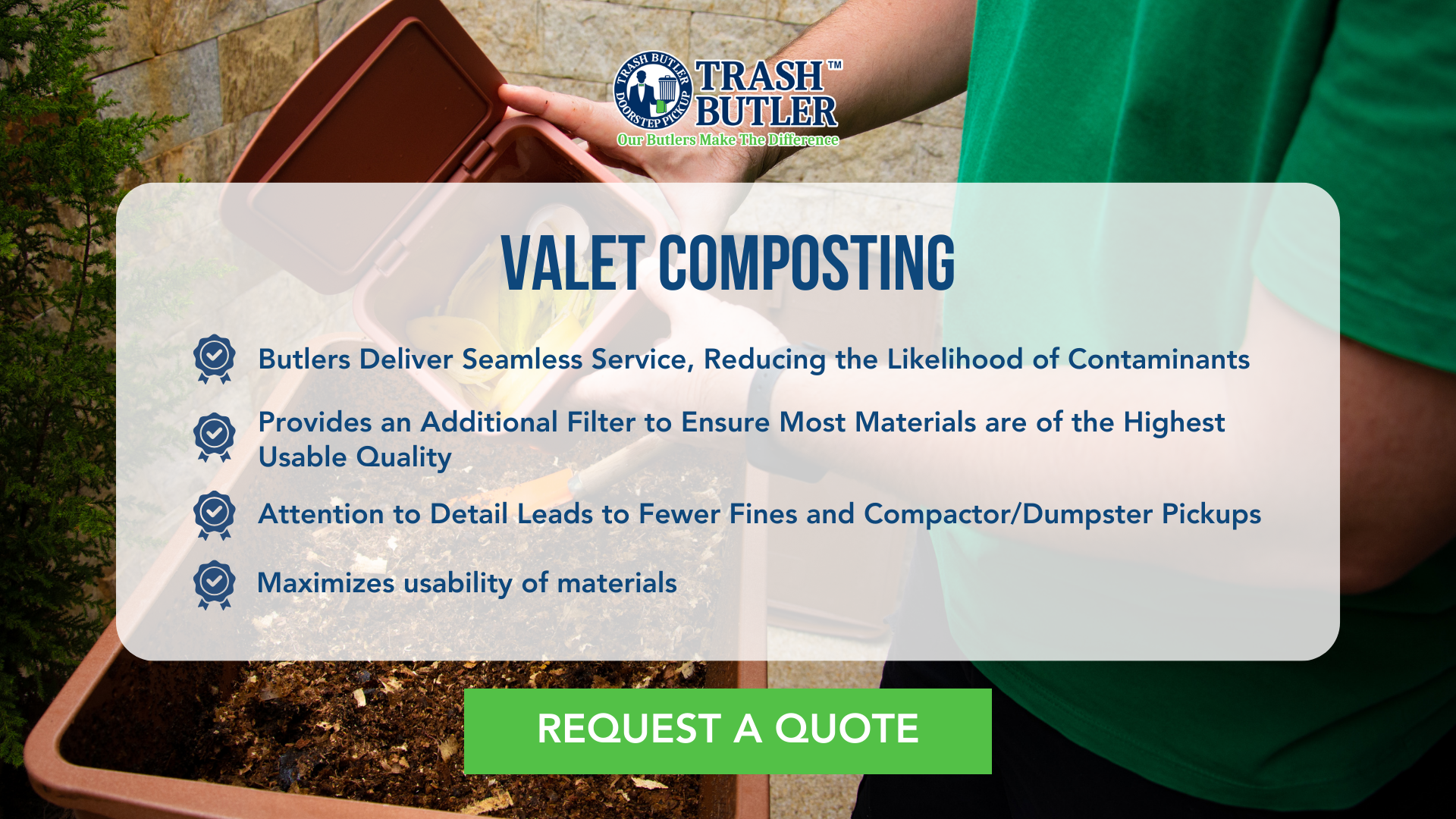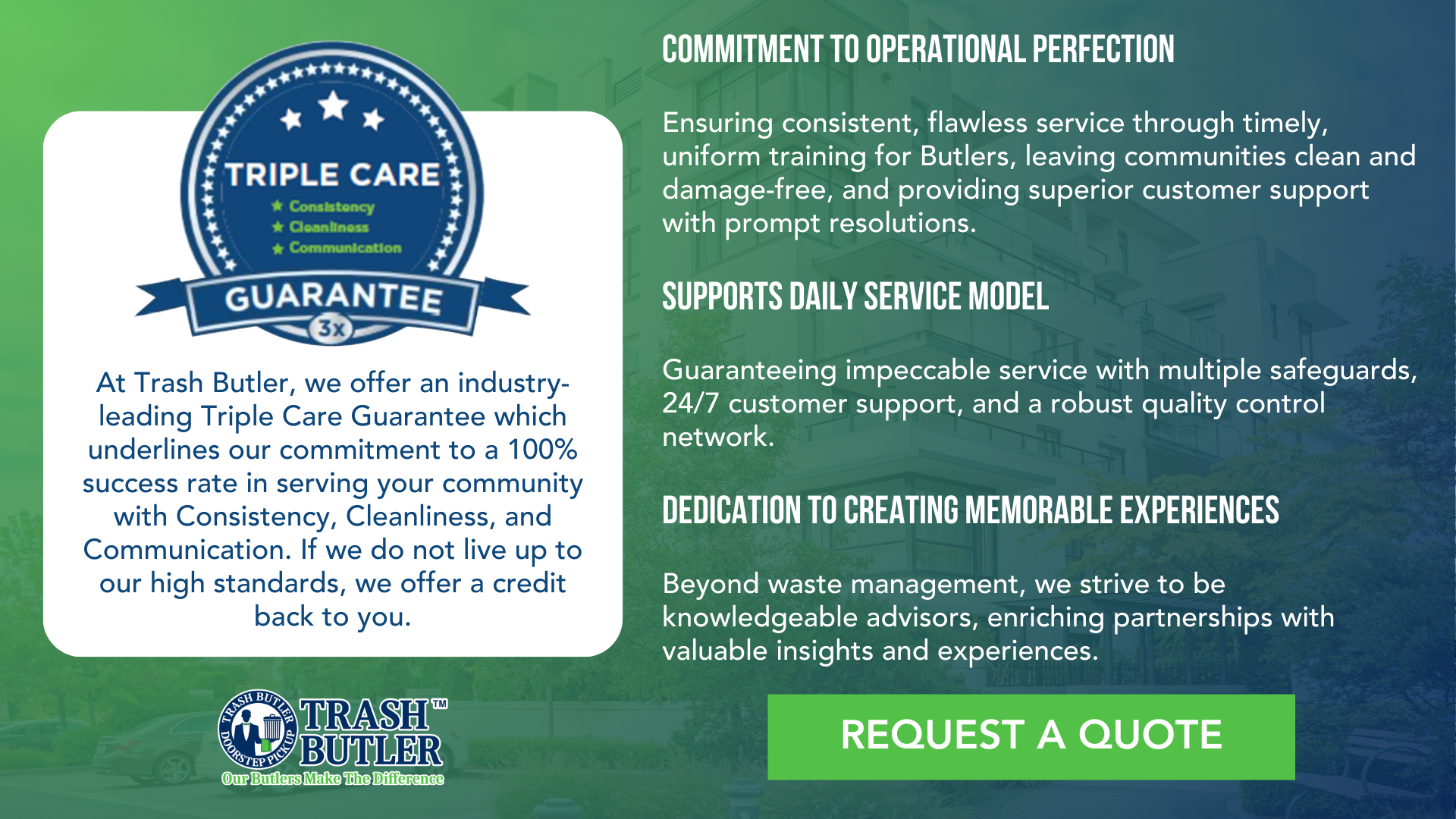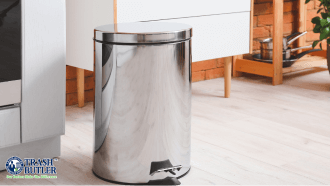Consider the space available for composting bins or systems. In apartments and condos, space can be limited, so opting for compact composting solutions like worm bins or bokashi composting may be more practical. Utilize compact bins with good ventilation for urban spaces. Ensure they fit on balconies or rooftops.
Secondly, educate residents on what can and cannot be composted. Food scraps, yard waste, paper products, and more can all be composted, but it’s important to avoid items like plastics, metals, and pet waste. Providing clear guidelines and signage can help streamline the composting process and reduce contamination.
Lastly, regular maintenance is essential for successful composting. Turning the compost, monitoring moisture levels, and addressing any issues promptly can help prevent odors and pests. By following these fundamentals with the right valet trash service provider, multi-family communities in Los Angeles can effectively implement composting initiatives and reduce organic waste going to landfills.

Composting in multi-family communities in Los Angeles can bring numerous advantages. It effectively reduces the amount of waste that is ultimately sent to landfills. It also creates an increase in nutrient-rich soil for successful gardening.
By implementing a composting program with Trash Butler, residents can actively participate in more sustainable practices. This can lead to a sense of community and environmental responsibility. Additionally, composting can contribute to a reduction in greenhouse gas emissions and contribute to a healthier local ecosystem overall.
Organic waste in landfills produces methane, a harmful gas for the environment. Composting with oxygen can turn your waste into nutrient-rich compost, promoting increased soil health and plant growth.
Composting reduces the volume of waste in landfills, easing the burden on waste management facilities. This can lead to cost savings for cities and a more sustainable waste management system. Additionally, composting decreases the need for synthetic fertilizers, reducing energy usage and water pollution risks.
Organizing composting workshops and setting up designated composting areas can empower residents. Creating educational materials can also allow property managers to empower residents. Residents can be encouraged to take a more active role in environmental conservation.
Use online forums and social media groups to facilitate communication and engagement among residents. Regular updates and challenges related to composting can keep residents motivated and involved in the initiative. This shared activity can strengthen relationships among neighbors and contribute to a more environmentally conscious and connected community in Los Angeles.
Inform residents about the benefits of composting and how they can actively participate. Make it easy for residents to compost by offering accessible collection systems within the community. Collaborate with local composting facilities to ensure that collected organic waste is processed efficiently.
Back city initiatives promoting composting and organic waste recycling. Integrate composting into daily practices to align with the city’s green goals. Join forces to reduce the environmental impact of waste and build a more sustainable future. Lead by example in embracing eco-friendly practices within the community.
When it comes to implementing valet trash services in apartment complexes, following best practices can make a significant difference in the efficiency and effectiveness of the service. Here are some key tips to ensure the smooth operation of valet trash services:
Effective communication is crucial when implementing a valet trash service. Ensure that all tenants are informed about the service, its schedule, and any specific guidelines to follow when disposing of their trash. Use various channels such as emails, flyers, and signage to keep residents updated.
Maintaining a consistent pick-up schedule is essential for the success of valet trash services. Make sure that trash is collected at the designated times on a regular basis to avoid any disruptions or inconveniences for residents. Consistency helps establish a routine for both tenants and service providers.
Composting in multi-family communities in Los Angeles can present unique challenges due to limited space, potential odor issues, and varying levels of resident engagement. However, with the right strategies in place, these obstacles can be effectively addressed and mitigated.
To address potential odor concerns, consider using compost bins with tight-fitting lids and incorporating carbon-rich materials like dry leaves or newspaper to help balance the compost pile. Regularly turning the compost and proper aeration can also help in controlling odors.
Partner with local composting facilities, nonprofits, or government programs to explore options for collective composting solutions. This collaboration can not only streamline the composting process but also provide additional resources and support for the community.
By implementing these solutions and fostering a culture of sustainability within multi-family communities in Los Angeles, overcoming common composting challenges can become more manageable, leading to a greener and more environmentally conscious living environment for all residents.
As the importance of sustainability and environmental consciousness continues to rise, the future of composting in multi-family communities in Los Angeles appears promising. With more residents seeking ways to reduce waste and live greener lifestyles, the demand for composting services in apartment complexes is likely to grow.
In the coming years, we can anticipate further advancements in technology that will make composting more accessible and efficient for residents in multi-family dwellings. Innovations such as automated composting systems and smart bins with sensors that alert residents when it’s time to empty them could become standard features in apartment buildings.
Municipalities may also introduce more initiatives and incentives to encourage composting practices among residents living in densely populated areas like Los Angeles. This could include tax breaks for property managers who implement composting programs, or city-wide compost collection services that make it easier for residents to participate in composting.
Additionally, education and awareness campaigns will play a crucial role in the future of composting for multi-family communities. As more people understand the environmental benefits of composting and see the positive impact it can have on reducing landfill waste and greenhouse gas emissions, the adoption of composting practices in apartment buildings is likely to increase.
Overall, the future looks bright for composting in multi-family dwellings in Los Angeles, with technology, policy support, and community engagement driving the movement toward a more sustainable urban living environment.

Composting is the process of effectively breaking down organic materials into nutrient-rich soil. It benefits the environment by reducing greenhouse gas emissions and diverting waste from landfills.
Common materials that can be composted in a multi-family setting include fruit and vegetable scraps, coffee grounds, eggshells, yard waste, and paper products.
While Los Angeles encourages active composting, there may be regulations on the type of composting systems allowed and the management of odors to prevent nuisances.
To maintain a healthy compost system in a dense urban area, it’s important to balance the carbon and nitrogen levels, aerate the compost regularly, and manage moisture levels.
Setting up a composting system for a multi-family community involves choosing the right location, selecting the appropriate composting method, educating residents, and ensuring proper maintenance.
Residents can get involved in composting by separating organic waste, participating in community composting initiatives, and advocating for composting programs in their buildings.
The city of Los Angeles supports composting efforts for multi-family communities through educational resources, incentives for composting, and partnerships with local organizations.
Yes, composting can help multi-family communities in Los Angeles reduce their waste disposal costs by diverting organic waste from landfills and lowering the amount of trash produced.
Compact compost bins or systems like worm bins, bokashi bins, or tumblers are among the most suitable options for multi-family communities in Los Angeles due to limited space and ease of use.

Why Valet Trash Services Are Essential For Orlando Apartments
Discover why valet trash for apartments in Orlando is essential. Enhance resident satisfaction and property value with top-notch valet trash…

Why Valet Trash Services Are Essential For Orlando Apartments
Discover why valet trash for apartments in Orlando is essential. Enhance resident satisfaction and property value with top-notch valet trash…

Everything Property Managers Need To Know About Doorstep Trash Pickup
Essential guide for property managers on doorstep trash pickup for apartments. Improve tenant satisfaction and streamline operations with…